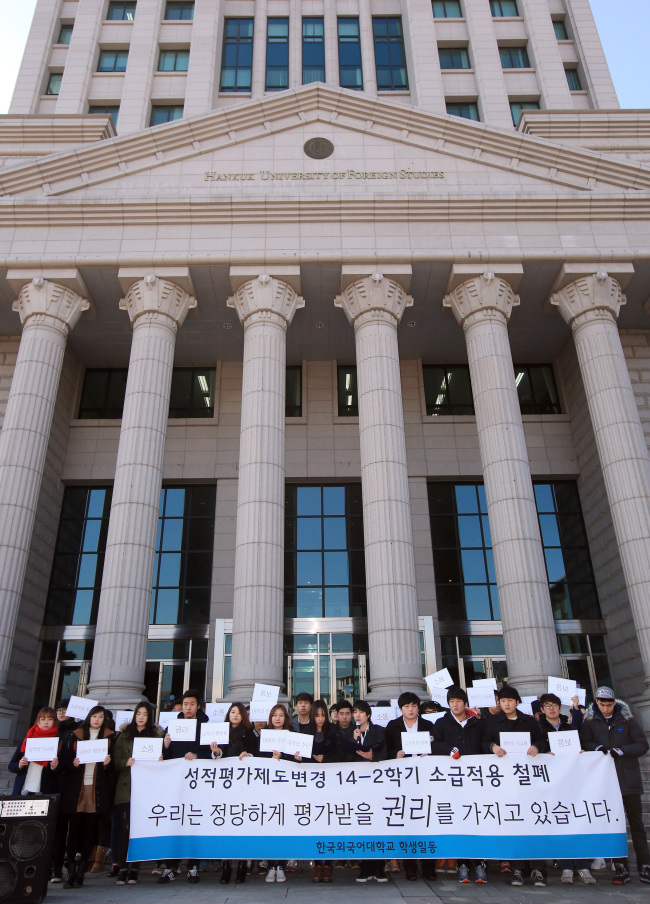With the government-initiated college reform about to take effect, tertiary education institutes across the country are scrambling to implement measures that will improve their scores in the upcoming evaluation by the Education Ministry.
Last year, the ministry rolled out plans to reduce the number of college openings by 2022. Measures are aimed at preventing problems likely to occur around 2018, when the number of college openings is expected to surpass the number of high school graduates.
The ministry will evaluate each school based on its efforts to improve its classes, faculty, grading system and scholarships, and the percentage of its graduate who find jobs. By August, colleges will be sorted into five categories. But only those in the top group will be exempted from having to cut the number of new students they can accept.
Colleges have already embarked on reforms to help their chances in the government assessment, as a poor result could substantially reduce their profits from students’ tuition fees.
Among such efforts have been a series of measures aimed at lowering the number of top grades handed out to students.
Last year, the ministry rolled out plans to reduce the number of college openings by 2022. Measures are aimed at preventing problems likely to occur around 2018, when the number of college openings is expected to surpass the number of high school graduates.
The ministry will evaluate each school based on its efforts to improve its classes, faculty, grading system and scholarships, and the percentage of its graduate who find jobs. By August, colleges will be sorted into five categories. But only those in the top group will be exempted from having to cut the number of new students they can accept.
Colleges have already embarked on reforms to help their chances in the government assessment, as a poor result could substantially reduce their profits from students’ tuition fees.
Among such efforts have been a series of measures aimed at lowering the number of top grades handed out to students.

Roughly 90 percent of students in 2013 graduated with an average grade of “B” or higher, according to data provided by Korea Council for University Education. Even top-tier schools like Seoul National University, widely considered the premier higher education institute in Korea, graduated 59.5 percent of its students with an “A” average.
Hankuk University of Foreign Studies recently announced it would begin using a curved grading system for all classes, and will retroactively apply the new measure to grades from the second semester of 2014. “Grade inflation has become a social issue that is damaging the credibility of college credits,” HUFS wrote in an email sent to students.
Students staged a fierce protest, saying the choice was made unilaterally. They also voiced concerns that the system change could hurt their prospects in the job market. Despite the university’s claims that it was a preset plan, students complained that the university was attempting to shift the burden of college reform to the students.
On the evaluation scale, 4 out of 60 points are allocated to grade distribution, which means schools that give out too many top grades will be penalized.
“To improve their scores in the government evaluation, the school violated the rights of the faculty as well as the students,” HUFS students said last week at a news conference on the Seoul campus. They also applied for an injunction to a local court, requesting a suspension of the school’s new policy.
Other schools have also attempted to curb the number of students scoring top grades. In November, Kyung Hee University sent a notice to faculty members urging them to keep the overall average GPA for all students in their classes below 3.0 (“B”).
Some schools are aiming to increase the employment rate for graduates, another major category in the state evaluation. Chung-Ang University has announced plans to close or merge departments, which observers say is an attempt to increase the overall employment rate for its graduates.
Ewha Womans University is banning students from postponing graduation without signing up for new semesters, a move widely interpreted as a bid to decrease the number of enrolled students. The number of students per faculty member is also a factor that can affect colleges’ grades in the ministry’s evaluation.
As in the case of HUFS, the slew of measures is sparking protests from students. Members of student councils at eight Seoul-based universities held a news conference in front of Korean Educational Development Institute on Monday and urged the Education Ministry to revise its reform plans.
“Side effects of the ministry’s forced, half-baked reform plans can be witnessed on several university campuses. The evaluation of the grading system has resulted in (universities) pushing ahead with unilateral changes to school rules, prompting conflicts on campus,” they said.
Student discontent is not the only problem hindering education authorities. Although the government has procured the budget for college reform, a bill that will provide it legal grounds ― proposed in April by Rep. Kim Hee-jung of the ruling Saenuri Party ― is still pending at the National Assembly.
By Yoon Min-sik (minsikyoon@heraldcorp.com)









![[Hello India] Hyundai Motor vows to boost 'clean mobility' in India](http://res.heraldm.com/phpwas/restmb_idxmake.php?idx=644&simg=/content/image/2024/04/25/20240425050672_0.jpg&u=)









